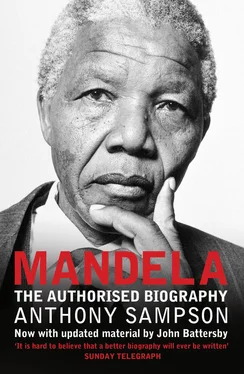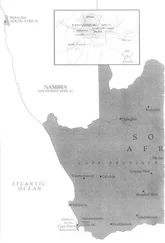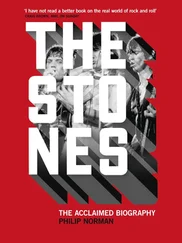Mandela was to spend six years at Wits, from 1943 to 1949, without any great distinction. He had an excellent memory, but his studies had to be squeezed in between his job as an articled clerk and his political commitments. Professor Hahlo could be scathing: ‘You call this an essay?’ ‘You know what I wish for him?’ Mandela told one of his white friends, Jules Browde: ‘That one day he has to write by paraffin light in Soweto.’ 28When he failed at the end of his course he applied to Professor Hahlo for permission to resit some papers, explaining that he often arrived home in Orlando after 8 p.m., ‘feeling tired and hungry and unfit to concentrate on my studies … if I could have done my work under more suitable conditions, I would have produced better results.’ 29But Hahlo, strictly following the rules, turned down his application, and Mandela was eventually to leave Wits without his LlB degree. Despite his justifications, he still felt a sense of failure. 30
At Wits Mandela suffered many humiliations. When he sat at a table in the law library, a white student moved away. When he went to a café with some white students, they were kept out because there was a ‘kaffir’ among them; one of them, Julius Wulfsohn, protested, but Mandela put his hand on his shoulder and simply said, ‘Just leave it.’ 31When he went on a whites-only tram with two Indians the conductor called him their ‘kaffir friend’, and had them charged in court. 32But he revealed no lasting grudges. Fifty years later, as President of the Republic, he invited the whole class of ’46 to a reunion at Wits. ‘I am what I am,’ he told them, ‘both as a result of people who respected me and helped me, and of those who did not respect me and treated me badly.’ 33
Back in Orlando, Mandela was seen as a man about town, and a ladies’ man. (‘I can’t help it if the ladies take note of me,’ he said later. ‘I’m not going to protest.’ 34) He spent much of his time with Walter Sisulu and his mother ‘Ma’ in their small Orlando house. In 1944 Walter married Albertina Thethiwe, a young nurse from the Transkei who had been educated by Catholics. She soon became ‘the backbone of the home’, as Sisulu described her, strong enough to be both mother and politician, while providing a fixed base. 35Albertina felt protective towards the handsome young country boy – ‘You could see from the way he dressed that he was from the country’ – and worried that gangsters in Alexandra, ‘the Spoilers’, would recruit him and exploit his aggression. 36
But Mandela soon seemed to be settling down. In the warm atmosphere of the Sisulus’ house he met Walter’s young cousin Evelyn Mase, four years younger than him, who had also recently arrived from the Transkei, to become a nurse – the most respected profession for African women – and was working at the Johannesburg General Hospital with Albertina. Their neighbour Es’kia Mphahlele later described her as an unassuming girl, with lazy eyes and a subdued and coy smile. 37Mandela was quickly attracted to Evelyn: after a few days they were going steady, and within months he proposed to her. They were married simply in 1944 at the Native Commissioner’s Court, without church bells or a wedding feast. At first they lived in one room of the small Orlando house of Evelyn’s brother Sam Mase, and later moved in with her brother-in-law Mgudlwa, a clerk in a mine.
‘Everyone we knew said that we made a very good couple,’ recalled Evelyn. 38She was very house-proud, always busy polishing, gardening or cooking, and took good care of Mandela. ‘She was a well-behaved, quiet lady, devoted to her family and husband,’ Mandela said. 39She was religious, from a more devout mission background than his. She did not see him as a politician, she recalls, but as a student. 40Mandela’s young sister Leabie, who came to stay with them, noticed that Evelyn ‘didn’t want to hear a thing about politics’. 41But she was supportive of her ambitious husband. ‘It was during his years with Evelyn that he grew and blossomed politically into the national figure he is today,’ wrote Phyllis Ntantala, who was a friend of both. 42
A year after the wedding Evelyn gave birth to their son Thembi. They moved briefly to 719 Orlando East, and soon afterwards to 8115 Orlando, one of hundreds of identical three-roomed ‘matchbox’ houses, with no electricity or inside lavatory. A stream of visitors, including Nelson’s nephew Matanzima, came to stay in the little house, often sleeping on the floor. The next year Evelyn produced a daughter, Makaziwe, who died after nine months.
Evelyn was often helped by Nelson’s mother, who came up from the Transkei; the two women got on well. Mandela also helped with the shopping, bathing the babies, and even sometimes took over the cooking. ‘Many wives envied Evelyn for her man who was dedicated to the family and bought food in town to take home,’ recalled Oliver Tambo’s wife Adelaide. 43He was ‘a highly organised person and very regular in his habits’, said Evelyn. ‘He was up at crack of dawn, jogged a few miles, had a light breakfast and was off for the day.’ 44
In four years in Johannesburg Mandela had come a long way from the quiet rural life of the Transkei. He had survived in the crowded townships, worked in a law office, studied at university and married. He had found his feet in a harsh and competitive environment. He still felt like a country boy confronting streetwise townsmen, fast-talking in English and Afrikaans. Yet his rural values and upbringing gave him an inner security, and he was conscious of being royal. ‘Whatever he did he was thinking more of becoming a chief and an important person of the royal house,’ said Sisulu. ‘When he was getting into big politics he still had that in mind.’ 45
But Mandela was being drawn into the political fray, which would give a wider context and a purpose to his urban life. As a proud aristocrat he had come up against all the frustrations and humiliations of a black man in the white man’s city, which had made him more aware of being one black man among millions. He was now having to see himself in a much harsher mirror; and soon he was to become an aspiring African nationalist, with an aggression and anger which it would take him a long time to control.
It was Mandela’s militant office friend Gaur Radebe who first brought him into politics in Alexandra township. In August 1943 Radebe helped organise a spectacular boycott of the buses to the city – the third in three years – after the fares went up from fivepence to sixpence. Mandela joined the boycott and a march of 10,000 blacks, which left the buses empty for nine days until the fare was put back to its former rate. It was an encouraging lesson in the power of boycott. 46
It was also Mandela’s first close contact with the African National Congress, the main black political body, which was now reawakening from a long slumber. The ANC had been set up in 1912 by a Zulu lawyer, Dr Pixley ka Seme, in direct response to the creation of the Union of South Africa in 1910, which had brought together the Afrikaners and the British: a union, said Seme in his opening address, ‘in which we have no voice in the making of the laws and no part in the administration’. The ANC’s first President was Dr John Dube, a Zulu educationalist, and the Secretary was Sol Plaatje, an interpreter and writer from Kimberley, while Seme was made Treasurer. 47As the ANC leaders watched their worst fears about white supremacy being borne out they organised delegations, demonstrations and protests, but they dreaded mass action or confrontation. The ANC was a staid, formal body with many members from royal families, represented in their own House of Chiefs – like the House of Lords – and Mandela came to see it as ‘obsessed with imperialist forms of organisation’. 48It was easily bought off by ineffectual government bodies: when Africans in the Cape Province were deprived of their vote in 1936, Congress leaders agreed to join the ‘Natives’ Representative Council’, which was supposed to advise the government, though they soon discovered it was (as one of them, Paul Mosaka, called it) a ‘toy telephone’. 49By the late thirties the ANC had become dormant and disorganised, overshadowed in its protests by communists and Trotskyists, and discredited by putting its faith in easily-broken white promises.
Читать дальше


![Мик Уолл - Когда титаны ступали по Земле - биография Led Zeppelin[When Giants Walked the Earth - A Biography of Led Zeppelin]](/books/79443/mik-uoll-kogda-titany-stupali-po-zemle-biografiya-thumb.webp)









